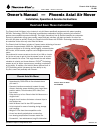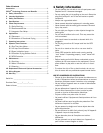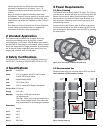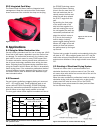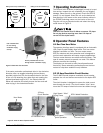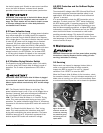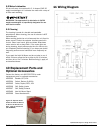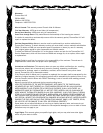
4
www.thermastor.com • sales@thermastor.comToll-Free 1-800-533-7533
55.3 Integrated Cord Wrap
The Phoenix Axial Air Mover features integrated cord
management. Wrap the cord around the cord wrap as
shown and secure the cord with the clasp on the plug.
the FOCUS Technology corner.
The Axial Air Mover sustains
this air flow for more than 20
feet and maximizes the air
velocity across the floor and
along the wall when placed
the at 4.5° angle from the
wall.
By touching the front edge
of the output side of the
axial air mover against the
wall and rotating the rest of
the unit against the wall, the
restoration professional will
place the axial air mover at
4.5° due to the housing’s
built-in design. Industry
experts agree placing Axial Air
Movers 45° angle to the wall
wastes air flow and reduces
the performance by forcing air
up the wall.
2500
2000
1500
1000
500
0
0 Feet 5 10 15 20 25
Air Velocity (fpm)
Figure 5: 4.5° to wall
as shown
Immediate high velocity air flow
at the outlet of the fan.
The best set up angle for quickly and completely drying the
sill plate is 4.5°. Set-up angles greater than 4.5° may be
used under unique circumstances such as corner air flow
and structure variations. Set-up angle should never exceed
23°.
6.3 Orienting of Directional Drying System
The axial air mover dries in counter-clockwise and
clockwise directions for optimum ease of use. The axial
air mover ships with rubber feet on one side of the unit for
counter-clockwise drying.
When the water restoration professional needs to employ
clockwise drying (such as the need to dry a door jamb),
simply rotate the axial air mover 90° so the FOCUS
Technology corner points toward the door jamb and floor
for the clockwise drying.
Figure 6: Placement for counter-clockwise drying
Figure 3: Cord wrap
6 Applications
6.1 Sizing for Water Restoration Jobs
Current industry standards call for one air mover per 10-16
linear feet of wall space, dependent upon the Class of wa-
ter damage. For commercial structures, the industry stan-
dard calls for one air mover for every 50-60 square feet.
The water restoration industry based these estimates on
the air mover technology available when writing the stan-
dards. Following these equipment-sizing standards when
using the Phoenix Axial Air Mover will result in dramatically
faster drying times. If the restoration professional desires
to merely achieve industry standard drying times, he can
use fewer Phoenix Axial Air Movers than standard equip-
ment standards allow.
6.2 Placement
Current industry guidelines suggest placing air movers at
a 15° - 45° angle to wall. These guidelines apply to air
movers without FOCUS Technology. FOCUS Technology
allows the restoration professional to place the Phoenix
Axial Air Mover at an angle nearly parallel to the wall.
The test graph shown below depicts immediate air flow at
Figure 4: Airflow of the Phoenix Axial Air Mover measured
3.5” parallel to wall.



